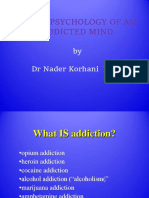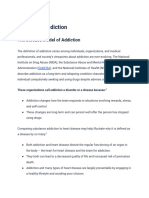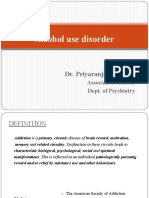0% found this document useful (0 votes)
3 views6 pagesAddiction
Addiction is a compulsive dependence on a behavior or substance, characterized by an inability to stop despite knowing the harm it causes. It involves the brain's reward system, where dopamine reinforces the desire to repeat pleasurable activities, leading to strong cravings. Treatment options include medical interventions, psychological therapy, and rehabilitation programs.
Uploaded by
masrorxalidCopyright
© © All Rights Reserved
We take content rights seriously. If you suspect this is your content, claim it here.
Available Formats
Download as ODP, PDF, TXT or read online on Scribd
0% found this document useful (0 votes)
3 views6 pagesAddiction
Addiction is a compulsive dependence on a behavior or substance, characterized by an inability to stop despite knowing the harm it causes. It involves the brain's reward system, where dopamine reinforces the desire to repeat pleasurable activities, leading to strong cravings. Treatment options include medical interventions, psychological therapy, and rehabilitation programs.
Uploaded by
masrorxalidCopyright
© © All Rights Reserved
We take content rights seriously. If you suspect this is your content, claim it here.
Available Formats
Download as ODP, PDF, TXT or read online on Scribd
/ 6

























































